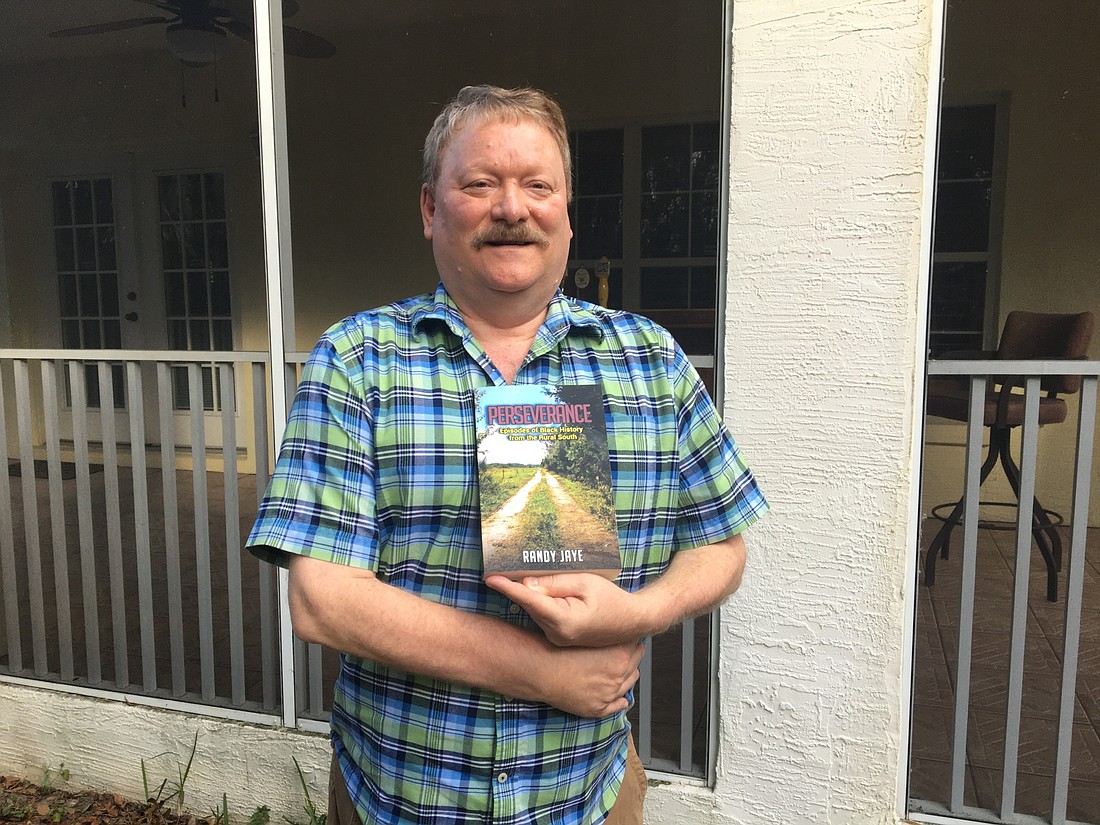- April 25, 2024
-
-
Loading

Loading

Randy Jaye had a realization after the publication of his book “Flagler County, Florida: A Centennial History” in May 2017.
“It was 100 percent lily-white,” Jaye said.
For the local historian, a Flagler Beach resident since 2012, this was a major omission of American history from the county’s story. He had written the centennial history book because, he said, “nobody else was going to,” and he set out to do the same for Flagler’s neglected black history.
The resultant book, “Perseverance: Episodes of Black History from the Rural South,” available in paperback from Amazon, began in early 2018 as a series of articles to be posted on the websites of African American Cultural Society and the Flagler Historical Society. But Jaye realized nonprofit websites can not guarantee that what they post will remain up, and he wanted a more permanent document of this history; one of the primary obstacles to his research had been the lack of information on black history in digital form.
He went into the Flagler Historical Society for “around 125 hours” over 6 months, compiling information on black history from 1917, when the county was incorporated, to 1981. Much of what he learned came from old issues of the Flagler Tribune, which ran for the duration of that period. 60 percent of the book, Jaye said, is purely Flagler history, but in its pages are the echoes of slavery, Jim Crow and both World Wars.
“You could write a whole encyclopedia on any one of these,” he said, so he did his best to summarize the greater events of national history succinctly, to better serve the stories of the county.
Stories such as how Sheriff Perry Hall was killed by a black bootlegger with a whiskey bottle to the head in the unincorporated town of Roy, or how Flagler had no black high school until 1949, leading many black teenagers to relocate to Daytona until Carver High School was built in 1950.
“As I went and reached out and learned about the Jim Crow era, I realized these stories were pretty typical of the Deep South,” Jaye said.
As a white man writing about black history, and as someone documenting events in living memory, Jaye was aware he needed to speak with some of the black citizens of Flagler who lived during the county’s Jim Crow era. He said it was difficult finding people who remembered those days and were willing to talk about them. Eventually he met senior citizens like Reverend Frank Giddens in Espanola and Daisy Henry of Bunnell, as well as some others willing to share their stories.
“Brought back many memories,” Giddens said. “You get a joy out of it. He’s done a tremendous job, he’s a good man.”
“I think about it every day,” Henry said. “A lot of the elderly didn’t even want to speak about their livelihood. We really came a long way. To get the whole picture, you have to have lived over there.”
“I got very comfortable with it when the started opening up,” Jaye said. “If you project yourself into their shoes, you don’t want to be there.”
A phrase kept coming up: “The other side of the tracks.” And indeed Bunnell was split by a railroad and segregated along it. Before Palm Coast came along, Flagler was mostly rural, of its black residents living and working in and around turpentine camps and farms.
“I worked for five dollars a day,” Henry said of the farm she worked at. “The kids today, they don’t believe that.”
It is not hard to understand why so many were reluctant to speak about their lives in Jim Crow Flagler: besides the legalized discrimination, the Ku Klux Klan was prevalent here and had marches in Bunnell during the 20s and 30s, featuring an electric cross in lieu of a burning one. While there were no reported lynchings or burnings, there were beatings, and the Klan sent threatening letters to black residents to intimidate them from voting.
Flagler had a White Citizens’ Council that became prominent in the 50s, and through its existence featured most of the county’s white community leaders, including Flagler Beach developer George Moody, Bunnell mayor Tom Holden and county commissioner George Wickline.
U.S.A. v. Flagler County School District ensued when Flagler schools filed a frivolous lawsuit against school integration claiming ignorance as to the meaning of the term “Negro.” The appeal lasted until 1972, making Flagler one of the last fully integrated districts.
“Some of this stuff is hard to believe,” Jaye said, “but this stuff happened here.”
He realized during his research how limited education on American history is.
“99 percent of what I learned about black history, I learned outside traditional high school and college teaching,” he said. “It’s still suppressed.”
He hopes his book will inspire more people to document the history of where they leave, eepecially the history of underrepresented people.
“I hope people add to the story, build the knowledge base up,” Jaye said. “Stuff like this you can’t forget about. Because you don’t want it to be repeated.”
“They’ll find they can make it in life,” Giddens said of young people who read about their history in the book. “They’ve got the privilege to make it in life, and make more progress than I did. They can profit from what we went through, but they have to work at it.”
The title, Jaye said, was the easiest part of the book to come up with.
“In one word,” he said, “the African American story in the United States is one of perseverance.”